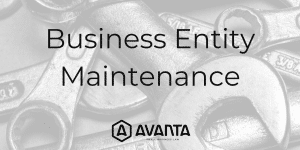
If you have ever owned a car, you know that you can’t just make the purchase and call it a day. You have to schedule oil changes, replace air filters, check the emissions, and keep the vehicle registered. What if I told you that owning a business is very similar. That is to say, you cannot just open a business and expect everything to run smoothly and legally without regular upkeep, also known as maintenance.
One of the biggest goals of forming a legal entity is to protect our personal assets. Without a legal entity, personal assets are at risk for any legal issues that may happen with the business. With a legal entity, we are given an opportunity to keep our personal assets out of such a lawsuit. Liability protection is not automatic and that’s why maintenance is vital.
So, what is business entity maintenance? These are any ongoing responsibilities that are associated with keeping your business running legally. Some examples would be:
- keeping up with state filings,
- filing and paying taxes,
- having adequate insurance,
- protecting the intellectual property with proper agreements,
- appointing officers to run daily operations,
- have enough capital to take care of the business operations,
- separating business funds from personal, and much more.
There are many different types of business entities to choose from. Each type of entity comes with its own unique set of regulations. Whether you are running an LLC or a corporation, regular business maintenance is what will limit your liability risk.
Fiduciary Duties
A Fiduciary Duty is a legal obligation to protect the business. Owners, officers, and managers of a legal entity are legally required to maintain the legal entity. If you fail to take maintenance seriously than the business is compromised and personal assets will not be protected. Unfortunately there is no way to 100% avoid being named in a lawsuit. In fact, if a lawsuit is filed against the business, then the owners will probably be named as well.
You might think that the legal entity will protect you from losing your personal assets. And you might be wrong if you have failed with maintenance. The court will keep the owners in the lawsuit if there’s enough evidence to show you did not fulfill your duty to maintain the legal entity appropriately. Or you will see how important maintenance is when the court removes you from the lawsuit because you submitted enough evidence that proves the maintenance of the legal entity. The moment this happens, you will be grateful you have the documentation necessary to keeping your personal assets out of a lawsuit involving the business.
Company Records
Keep your company records safe. Why? If you are responding to a lawsuit, you don’t want to be scrambling to find all the documents you need to prove that you have maintained the legal entity properly. Figure out right now where you will keep all of the company records. Is it a google drive folder or an actual metal filing cabinet? It doesn’t matter as long as you do it. For an LLC, here is a list of such documents you should retain in a safe location:
- Articles of Organization OR a Certificate of Organization.
- Operating Agreement.
- Any document required by city, state of Utah, or federal government.
- Amendments to Operating Agreement.
- Consents by Members, Managers, and Officers.
- Any meeting minutes by Members.
- Agreements and contracts of all kinds.
- Powers of Attorney.
- Leases affecting company property.
- Promissory notes and mortgages affecting company property.
- Deeds affecting company property.
- Copies of emails and/or text messages that documents particular conversations or meetings regarding LLC business like with employees, business partners, vendors, customers, clients, patients, etc.
- Copies of anything you think of as important to the company.
The company record is the maintenance documentation that is used as the evidence to prove the owners of the legal entity are separate from the legal entity. Maintenance records acts as a boundary line between the owners and the legal entity itself. The most common mistake that keeps your personal assets in a lawsuit is the failure of a company to document certain business decisions.
Consent Forms and Business Entities
A major responsibility that comes with business maintenance is documenting certain business decisions with a consent form. So, The operating agreement for an LLC lays out how the company is set up, how decisions will be made, and how issues will be handled. Consent forms put into action the terms of the operating agreement and formally proves the consent to proceed with such action. Furthermore, consent forms exhibit compliance with the law, the fiduciary duty to protect the assets and that the decision was deliberated and consented to appropriately all to protect the business.
A business entity consent form can also be used to limit a disagreement if there is more than one owner. For example, if an update to the company records is required, then a consent signed by the business owners before such changes are done will avoid any misunderstanding in the future on who consented to such changes. Below are examples of actions that should have consent by all owners:
- Amend the Operating Agreement for an LLC, or amend the Bylaws and Shareholder’s Agreement for an S Corp.
- Sell or transfer any ownership interest or stock.
- Call upon the owners for additional capital contributions.
- Apply for a business loan that will encumber the business assets.
- Make a purchase that is above an agreed upon amount.
- Employ family members of the owners.
- Dissolve the legal entity with the state.
Legal entity consent forms force all owners to be on the same page before putting the assets of the business at risk. Therefore, the goal is to prevent one owner from going rogue.
Protect Your Personal Assets with Maintenance
Basically, just like you worry about the wellbeing of your car, you should be worrying about the wellbeing of your business. Business entity maintenance involves a lot of responsibilities that ensure your business stays compliant and organized. By staying on top of these responsibilities, you can protect your personal assets by keeping them out of a lawsuit involving the business.
Don’t wait until your business gets into a figurative car crash to start maintenance, by that time it could be too late. As the owner of the business, you have legal obligations to protect the business. Let us help you figure out what your maintenance obligations are and show you how to comply. Hiring an experienced attorney for your legal entities is the first step to protecting your business!

